
MONDAY, March 25 (HealthDay News) — Child development experts advise parents not to introduce solid foods, such as baby cereal, into an infant’s diet until the infant is at least 4 to 6 months old. However, new research suggests that about 40 percent of parents aren’t heeding this advice and are giving their babies solid food much sooner.
The researchers also found that formula-fed infants were much more likely to be given solid foods too early than were breast-fed infants.
“Health authorities do advise parents to wait until after 4 months because infants aren’t developmentally ready to eat solid foods before then,” explained the study’s senior author, Kelley Scanlon, an epidemiologist at the division of nutrition, physical activity and obesity at the U.S. Centers for Disease Control and Prevention (CDC) in Atlanta.
Scanlon said there are a number of other reasons why experts don’t recommend early feeding. One is that the early introduction of solid foods has been linked to a shorter duration of breast-feeding. Early solid food consumption has also been linked to the development of chronic conditions, such as childhood obesity, celiac disease, diabetes and eczema, according to background information in the study.
To see how often the expert recommendations on solid foods are followed, Scanlon and her colleagues reviewed data provided by more than 1,300 mothers with infants.
The investigators found that 40 percent of mothers introduced solid foods before their infants were 4 months old. About 24 percent of exclusively breast-feeding moms introduced early solid food, while close to 53 percent of formula-fed babies were given solid foods early on. Slightly more than 50 percent of babies that were fed both breast milk and formula were introduced to solid foods before 4 months.
Reasons cited by the moms included, “My baby was old enough,” “My baby seemed hungry,” “I wanted to feed my baby something in addition to breast milk or formula,” “My baby wanted the food I ate,” “A doctor or other health care professional said my baby should begin eating solid food,” or “It would help my baby sleep longer at night,” according to the study.
Scanlon said that mothers who formula-fed their babies were more likely to report having a health care provider tell them that solid foods before 4 months were OK.
That suggests that there’s a real need for doctors and other health care providers “to provide accurate and clear information,” Scanlon said. These experts “can help parents better understand their babies’ cues for feeding,” she said. “A baby who’s crying a lot isn’t always hungry.”
The researchers also found that mothers who introduced solid foods earlier were more likely to be younger, unmarried, have less education and be participating in government food programs for women, infants and children.
Dr. Ruby Roy, an attending physician at La Rabida Children’s Hospital in Chicago, said she wasn’t surprised by the study’s findings. “A lot of these parents say that at 3 months, their children are more hungry. And, that’s true. There’s usually a growth spurt at 3 months, so increasing breast-feeding or the amount of formula is appropriate,” said Roy.
Roy said she doesn’t tell parents to wait for a specific age, but rather to look for signs that the baby is ready for solid foods. “Some children will be ready at 6 months, while others are fine at 5 months and 2 weeks, so instead of an absolute rule, I explain that they’re waiting for the baby to be ready,” she said.
According to Roy, babies aren’t ready for solids until they can sit up by themselves when they’re well-supported and when they’ve lost what’s known as the “tongue thrust” reflex. If you try to feed your baby solid foods on a spoon and your baby pushes the food out with his or her tongue, your baby isn’t ready for solids yet, Roy said.
Roy and Scanlon agreed that parents shouldn’t try to work around this reflex by adding baby cereal to bottles.
“Solid foods are not intrinsically better or more calorically dense than breast milk or formula,” said Roy. And she added, “Solid foods can harm kids when started too early.”
Results of the study were released online March 25 in advance of publication in the April print issue of Pediatrics.
More information
Learn more about the right time to introduce solid foods to infants from the American Academy of Pediatrics.

